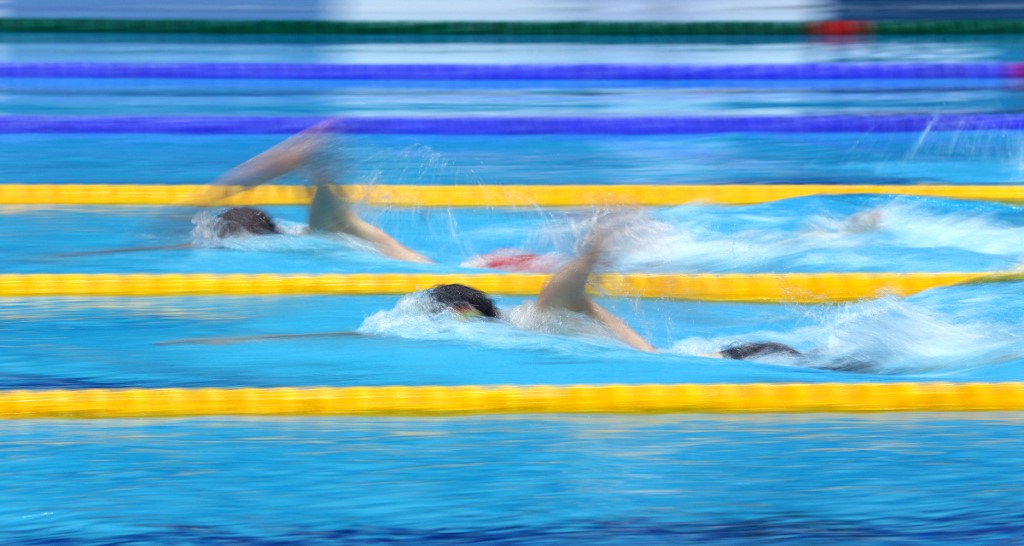THE ABSOLUTE BASICS

FILE – Athletes compete during day 3 of the German Olympic Qualifications, which doubles as a qualifier event for the coronavirus delayed 2020 Tokyo Olympics, at Europa Sportpark (SSE) in Berlin on April 18, 2021. (Photo by Ronny Hartmann / AFP)
* There are races in four strokes — freestyle, breaststroke, backstroke and butterfly — and also individual and relay medley events that involve one swimmer using all four strokes or team members each using a different stroke.
* Olympic pools are 50 meters long and timing is to 1/100th of a second. Touchpad technology tracks when swimmers have finished.
* The shortest race in the pool is the 50m freestyle. The longest is the 1,500m free. The open water marathon is 10km.
HOW MANY MEDALS?
There will be a total of 35 events – 17 each for men and women and a mixed 4×100 medley relay.
WHAT HAPPENED IN RIO?
The United States dominated the medals table with 33 (16 golds), ahead of Australia on 10 (three golds).
Michael Phelps made his Olympic farewell, the U.S. giant winning six medals including five golds to take his career haul to 28 medals (and a record 23 golds).
Compatriot Katie Ledecky won the women’s 200, 400 and 800 freestyle as well as a 4×200 relay gold and 4×100 silver.
Ryan Lochte, one of America’s most decorated swimmers, triggered a furor when he spun a tale about being robbed at gunpoint at a gas station after a party. He was suspended for 10 months and dropped by four major sponsors.
WHAT CAN WE EXPECT IN TOKYO?
Katie Ledecky competes in the Women’s 800 Meter Freestyle Final on Day Four of the TYR Pro Swim Series at San Antonio on March 06, 2021 in San Antonio, Texas. Tom Pennington/Getty Images/AFP (Photo by TOM PENNINGTON / GETTY IMAGES NORTH AMERICA / Getty Images via AFP)
Ledecky and U.S. teammate Caeleb Dressel are set to star in the first Games without Phelps since 1996. Both have plenty of medals in them.
Ledecky — world record holder in 400, 800 and 1,500m freestyle — could win the 1,500m, a new event for the women in Tokyo, and 200m on the same day.
The 400m could be quite a battle with Australian world champion Ariarne Titmus, though.
Britain’s Adam Peaty has his own world record to beat in the men’s 100m breaststroke while Hungary’s world record holder Kristof Milak should shine in the 200m butterfly.
Japanese star Rikako Ikee will be a popular favorite in the pool after her strong recovery from leukemia.
Through the universality rule, Luke Gebbie (100m and 50m freestyle) and Remedy Rule (200m butterfly and 200m freestyle) will be representing the Philippines in the Games.
WHAT’S NEW?
Tokyo will be the first time a mixed gender swimming event features on the program with the mixed 4×100 medley relay of two men and two women per team. Teams decide which athlete swims each stroke.
The women’s 1,500 and the men’s 800 freestyle are other novelties.
Heats will be held in the evening with semi-finals and finals in the morning.
WHEN IS IT HAPPENING?
July 24-Aug. 1 at the Tokyo Aquatics Centre. Marathon swimming Aug. 4-5.
HOW DID WE GET HERE?
Swimming has been a part of every Summer Olympics since the first in 1896 and has the second biggest program after athletics. Women’s events were added in 1912.
Mark Spitz of the United States won seven golds (all in world record times) at the 1972 Munich Games. In 2008 Phelps went one better with eight.
WELL FANCY THAT
London 1908 was the first time a pool was used for Olympic swimming. At Athens in 1896, competitors started from a boat at sea and had to swim to shore, while in Paris 1900 they swam with the current in the Seine river. At St Louis in 1904 the races were held in a lake.
Early Olympics also featured underwater swimming and an obstacle race.


